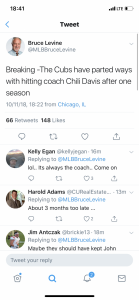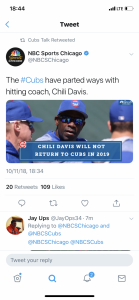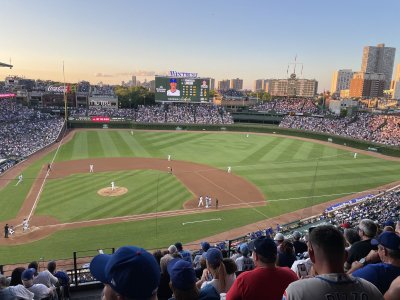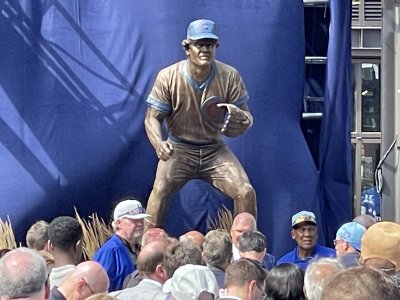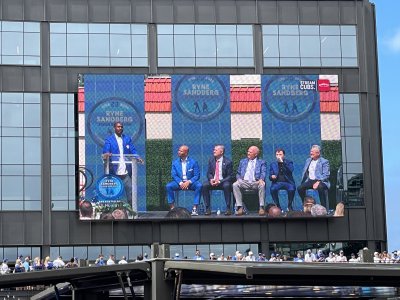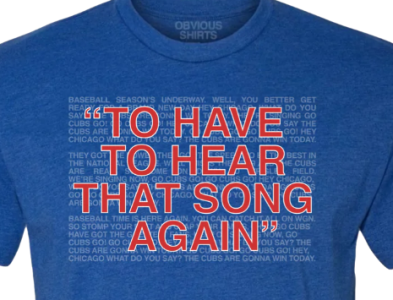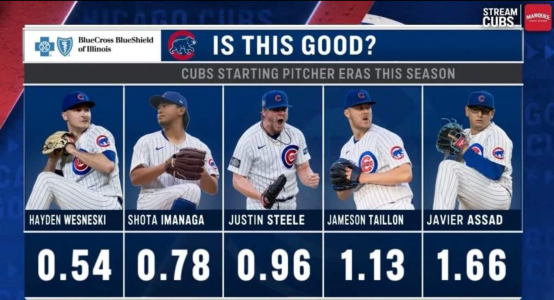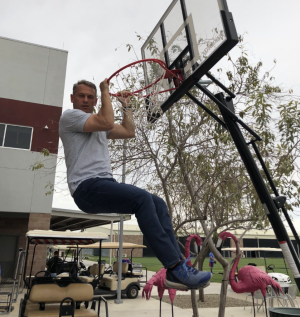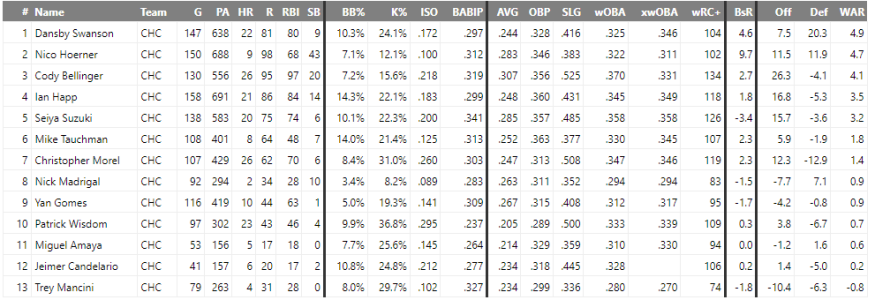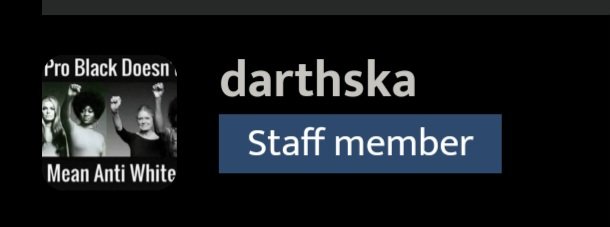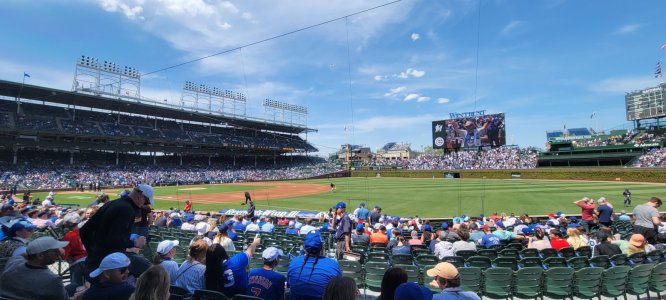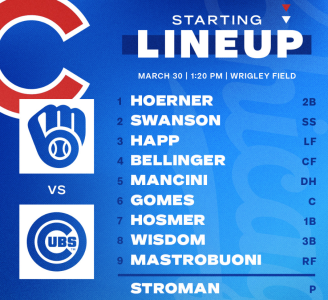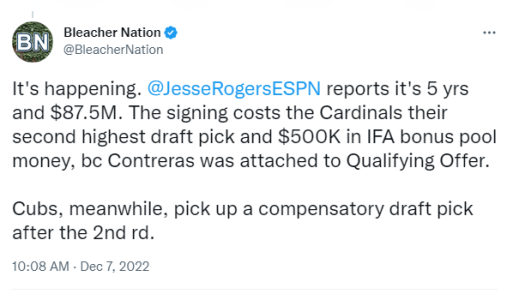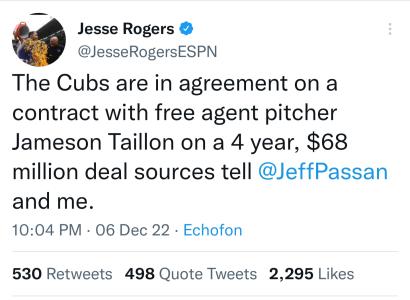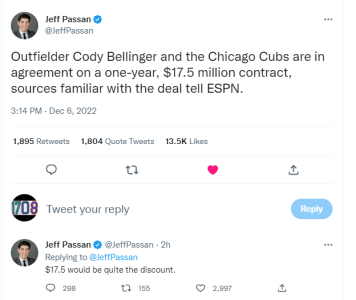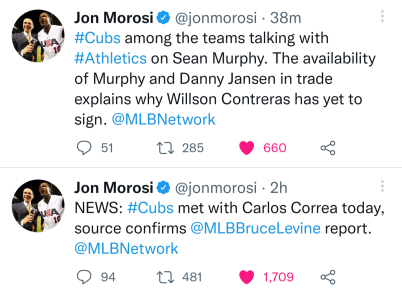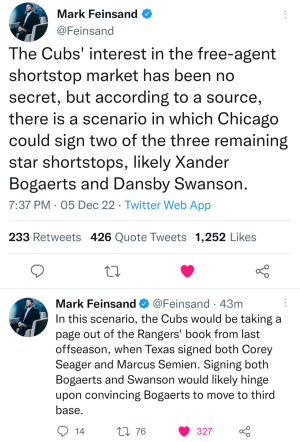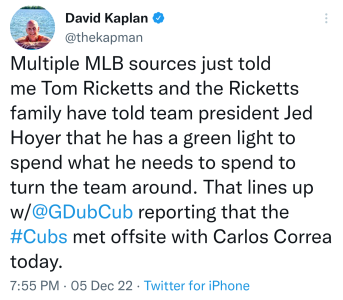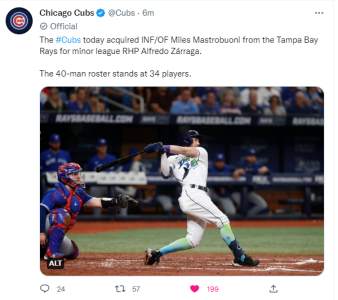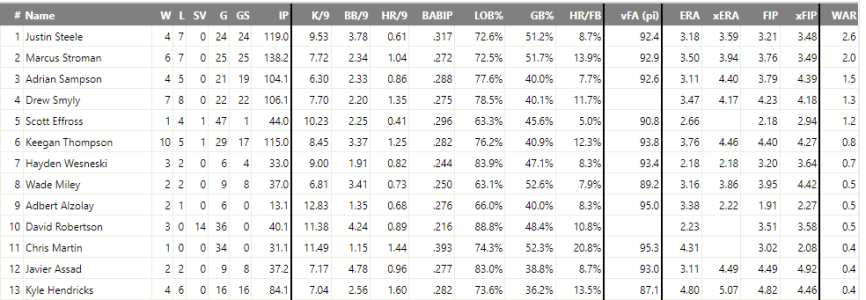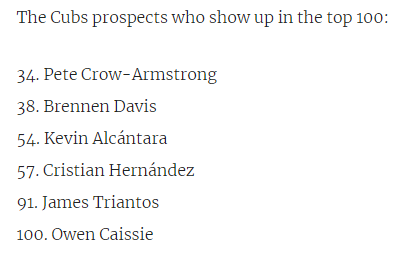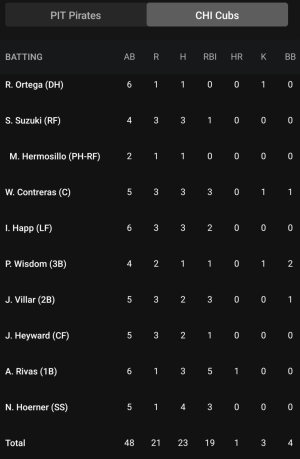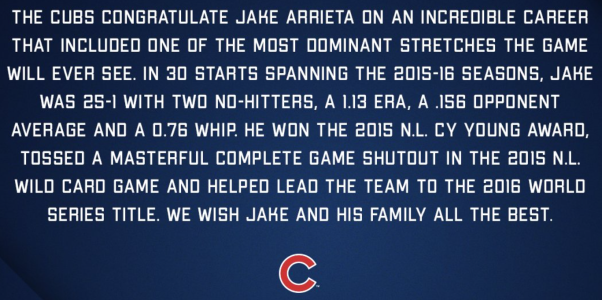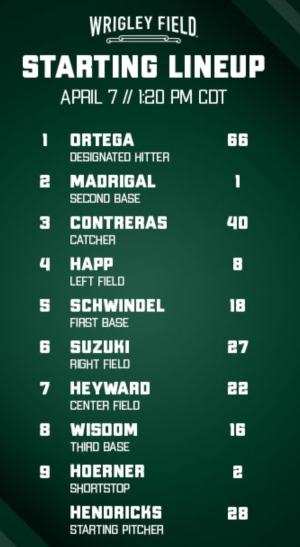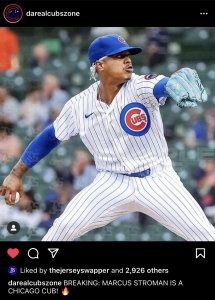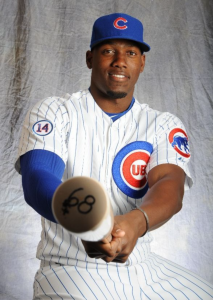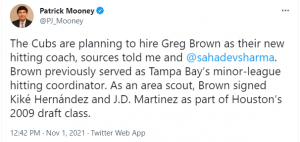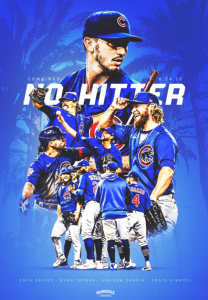Navigation
Install the app
How to install the app on iOS
Follow along with the video below to see how to install our site as a web app on your home screen.
Note: This feature may not be available in some browsers.
More options
You are using an out of date browser. It may not display this or other websites correctly.
You should upgrade or use an alternative browser.
You should upgrade or use an alternative browser.
Official 2023 Chicago Cubs Season Thread Vol: (17-17)
- Thread in 'Sports & Training' Thread starter Started by CP1708,
- Start date
- Jul 17, 2017
- 1,239
- 583
I must say re: Maddon, for every move that seemed to work in the past, they completely backfired this year ...
Pinch hitting the worst hitter in postseason history with the bases loaded will go down as the summary of the 2018 Cubs ...
Pinch hitting the worst hitter in postseason history with the bases loaded will go down as the summary of the 2018 Cubs ...
I must say re: Maddon, for every move that seemed to work in the past, they completely backfired this year ...
Pinch hitting the worst hitter in postseason history with the bases loaded will go down as the summary of the 2018 Cubs ...
Kyle Schwarber has a -62 wRC+ in high leverage situations. Negative, 62.
Jason Heyward actually had much better numbers in late game situations on the year.
It's standard analytics he was playing, same as the Dodgers, same as the A's, same as the Red Sox, Yankees, etc.
- Jul 17, 2017
- 1,239
- 583
I always love the "analytics" argument ... I literally gave you a statistic that is much more representative of a likely outcome and you explain it away with another statistic ...Kyle Schwarber has a -62 wRC+ in high leverage situations. Negative, 62.
Jason Heyward actually had much better numbers in late game situations on the year.
It's standard analytics he was playing, same as the Dodgers, same as the A's, same as the Red Sox, Yankees, etc.
- Sep 7, 2005
- 9,067
- 5,699
Good read imo
Spiegel: Sustained Success Never Felt So Empty
The Cubs and their fans must now deal with the cost of excellence.
Matt Spiegel
(670 The Score) The Cubs' failings in their 2-1 loss to the Rockies in the National League wild-card game Tuesday night were excruciating.
A Rockies outfielder overruns a pop-up, but that's immediately followed by a double play from the Cubs' best hitter to end the sixth.
An inning later, one Cubs pinch-hitter is gifted with catcher’s interference to load the bases against a rattled reliever, but the next one flails at a 3-2 fastball off the plate to enable his escape.
The Rockies’ third catcher, hitting .170 on the season, comes through with the go-ahead single in the top of the 13th.
The speed-demon non-hitting 25th Cub is forced to bat for the second time to lead off the bottom of the 13th, and he swings haplessly at ball four.
In the end, those 4 hours, 55 minutes of wild-card torture porn played out like a slow mercy killing. The Cubs' offense was so clearly lifeless over these past three weeks or so, and Tuesday was the third and final hideous performance over the last four days.
On Saturday, the Cubs managed one run on five hits in a loss to the Cardinals. On Monday, they produced one run on three hits in a loss to the Brewers. With the season on the line Tuesday, they had just one run on six hits over 13 innings in the loss to the Rockies.
And ... scene.
Where did the quality at-bats go? How was this batch of professionals so consistently overmatched in the biggest of moments? Did they get trapped between the learned patient approach of taking lots of pitches per plate appearance and the "hit your pitch whenever you get it" philosophy that has pushed back and now spread around the league?
There are lots of painful questions to answer in what should be a fascinating offseason.
Cubs fans are trapped in the absurd reality of shifted expectations. It's a frustratingly empty feeling here in October, after a 95-win season. Sustained success never hurt so much.
This is the cost of excellence. The bar raises, and anything short of a championship is never quite as good for them or for anybody. It reminds me of what Patriots coach Bill Belichick told a 30-year-old general manager after the latter won the 2004 World Series in Boston. Theo Epstein called Belichick for advice on how to handle success and was told: "You're f-----."
As we try to gain context of the moment, we look back on an offseason for the Cubs that gets an F. But as bad as it was, terrific in-season pickups raised the overall acquisitions grade. Cole Hamels was as good as you dreamt Yu Darvish would be. In Tyler Chatwood’s wild wake, Mike Montgomery had his best year as a starter. Brian Duensing, re-signed to a two-year deal last winter, ended up being completely outside the circle of trust by August, but scrap-heap find Jorge de la Rosa surprisingly stepped in. Trade pickup Jesse Chavez was brilliant in a middle-relief role, allowing Pedro Strop to ably fill the Brandon Morrow void.
So the pitching mostly evened itself out. The issue, as you felt and saw all year long, was the feast-or-famine offense. This Cubs lineup should be terrifying, but too often it was a pushover. When the Cubs won, they averaged 6.5 runs per game, just off the Red Sox's league-leading 6.7 mark. But when the Cubs were bad, they were horrid: Counting the loss Tuesday, they scored one or zero runs on 40 occasions, which tied for the league-high mark with the Orioles, who lost 115 games. How this Cubs team won 95 is difficult to figure.
Seriously, think about it. Kris Bryant played in 102 games and was a frightening shell of himself to finish the year. Anthony Rizzo’s first’s six weeks were awful. Willson Contreras' second half was a curious, maddening disaster. Jason Heyward’s comeback year still manifested in an OPS of .731. David Bote was a godsend briefly, but then had an OPS of .538 (!) since Aug. 15. Addison Russell continued to regress offensively, then saw his season (and perhaps his Cubs career) come to an ugly end following domestic abuse allegations. Ian Happ’s year was a bizarre roller coaster. The two starting pitcher free-agent additions were complete busts. Kyle Hendricks didn’t find his form consistently until July.
If I told you these stories and put a 95-68 record next to it, you’d laugh in my face. So, the manager did a great job, right?
Yes, you could argue that Joe Maddon had his best regular season, finagling lineups and relief matchups more than ever while dealing with all the aforementioned issues and injuries. Maddon is under contract through 2019, but I’ve been saying for a while now that I doubt he will get another deal. Tension with the brain trust has been there for a a few years. What manager has ever come out of a World Series win with less respect than he’d had before? Maddon did -- and not just with the fans.
Then there were some questionable decisions this season. Did Maddon overuse and thereby break the fragile Morrow? When explaining Morrow's injury that sent him to the disabled list in mid-July, Epstein himself is the one who brought up Morrow’s usage for three straight days in late May and early June, without provocation.
More recently in addressing the blog in which Melisa Reidy-Russell detailed allegations of physical abuse toward Addison Russell, Maddon fumbled the handling. He initially explained he didn't even need to read it before Epstein restated the organization's stance of taking the allegations seriously. The next day, Maddon told the media that he'd read the blog, giving real emotional weight to the issue for the first time.
The Cubs have always known that Maddon would have waning effectiveness. Almost all managers do. The message -- or in his case sometimes the lack thereof -- gets old. Maddon is deeply committed to being calm and locked in to conveying logic, simplicity and steady sensibility. That can get old just like anything else. The real problem comes if a team looks listless and lifeless.
Like these Cubs hitters have far too often down the stretch.
My bet has been that Maddon enters 2019 as a lame-duck manager in the final year of his deal. But the attention and focus on his security that has exploded with the wild-card game loss isn't going to be something a team can live with for a full season. It may indeed be time to extend or eject.
There's one more scary item to address: Bryant’s injury and subsequent failure to return to form is a big, big deal. His left shoulder hampered him almost all year. He tried to adjust his swing finish when he came back the first time, but that didn’t stop the pain and he returned to the DL. Then when Bryant returned again, there were even bigger changes. He vacillated between a one-hand and two-hand approach to his follow-through. Down the stretch, he was late on the kind of fastballs that he has always murdered. Bryant and his coach/father are incredible students of hitting, and their work habits and knowledge should help in finding his way back to dominance. But the pain, struggle and failed adjustments were real and scary.
In the end, what feels emblematic of the 2018 Cubs season is the lack of any real celebration. Fans didn’t have a clean moment to be happy about making the postseason, and neither did the players. Everyone waited for the NL Central crown, which the Brewers stepped up and took.
So after a fourth straight playoff appearance for the first time in Cubs history, there isn’t too much joy. It’s going to be a long, awkward winter of self-reflection.
This sport is really, really hard.
Spiegel: Sustained Success Never Felt So Empty
The Cubs and their fans must now deal with the cost of excellence.
Matt Spiegel
(670 The Score) The Cubs' failings in their 2-1 loss to the Rockies in the National League wild-card game Tuesday night were excruciating.
A Rockies outfielder overruns a pop-up, but that's immediately followed by a double play from the Cubs' best hitter to end the sixth.
An inning later, one Cubs pinch-hitter is gifted with catcher’s interference to load the bases against a rattled reliever, but the next one flails at a 3-2 fastball off the plate to enable his escape.
The Rockies’ third catcher, hitting .170 on the season, comes through with the go-ahead single in the top of the 13th.
The speed-demon non-hitting 25th Cub is forced to bat for the second time to lead off the bottom of the 13th, and he swings haplessly at ball four.
In the end, those 4 hours, 55 minutes of wild-card torture porn played out like a slow mercy killing. The Cubs' offense was so clearly lifeless over these past three weeks or so, and Tuesday was the third and final hideous performance over the last four days.
On Saturday, the Cubs managed one run on five hits in a loss to the Cardinals. On Monday, they produced one run on three hits in a loss to the Brewers. With the season on the line Tuesday, they had just one run on six hits over 13 innings in the loss to the Rockies.
And ... scene.
Where did the quality at-bats go? How was this batch of professionals so consistently overmatched in the biggest of moments? Did they get trapped between the learned patient approach of taking lots of pitches per plate appearance and the "hit your pitch whenever you get it" philosophy that has pushed back and now spread around the league?
There are lots of painful questions to answer in what should be a fascinating offseason.
Cubs fans are trapped in the absurd reality of shifted expectations. It's a frustratingly empty feeling here in October, after a 95-win season. Sustained success never hurt so much.
This is the cost of excellence. The bar raises, and anything short of a championship is never quite as good for them or for anybody. It reminds me of what Patriots coach Bill Belichick told a 30-year-old general manager after the latter won the 2004 World Series in Boston. Theo Epstein called Belichick for advice on how to handle success and was told: "You're f-----."
As we try to gain context of the moment, we look back on an offseason for the Cubs that gets an F. But as bad as it was, terrific in-season pickups raised the overall acquisitions grade. Cole Hamels was as good as you dreamt Yu Darvish would be. In Tyler Chatwood’s wild wake, Mike Montgomery had his best year as a starter. Brian Duensing, re-signed to a two-year deal last winter, ended up being completely outside the circle of trust by August, but scrap-heap find Jorge de la Rosa surprisingly stepped in. Trade pickup Jesse Chavez was brilliant in a middle-relief role, allowing Pedro Strop to ably fill the Brandon Morrow void.
So the pitching mostly evened itself out. The issue, as you felt and saw all year long, was the feast-or-famine offense. This Cubs lineup should be terrifying, but too often it was a pushover. When the Cubs won, they averaged 6.5 runs per game, just off the Red Sox's league-leading 6.7 mark. But when the Cubs were bad, they were horrid: Counting the loss Tuesday, they scored one or zero runs on 40 occasions, which tied for the league-high mark with the Orioles, who lost 115 games. How this Cubs team won 95 is difficult to figure.
Seriously, think about it. Kris Bryant played in 102 games and was a frightening shell of himself to finish the year. Anthony Rizzo’s first’s six weeks were awful. Willson Contreras' second half was a curious, maddening disaster. Jason Heyward’s comeback year still manifested in an OPS of .731. David Bote was a godsend briefly, but then had an OPS of .538 (!) since Aug. 15. Addison Russell continued to regress offensively, then saw his season (and perhaps his Cubs career) come to an ugly end following domestic abuse allegations. Ian Happ’s year was a bizarre roller coaster. The two starting pitcher free-agent additions were complete busts. Kyle Hendricks didn’t find his form consistently until July.
If I told you these stories and put a 95-68 record next to it, you’d laugh in my face. So, the manager did a great job, right?
Yes, you could argue that Joe Maddon had his best regular season, finagling lineups and relief matchups more than ever while dealing with all the aforementioned issues and injuries. Maddon is under contract through 2019, but I’ve been saying for a while now that I doubt he will get another deal. Tension with the brain trust has been there for a a few years. What manager has ever come out of a World Series win with less respect than he’d had before? Maddon did -- and not just with the fans.
Then there were some questionable decisions this season. Did Maddon overuse and thereby break the fragile Morrow? When explaining Morrow's injury that sent him to the disabled list in mid-July, Epstein himself is the one who brought up Morrow’s usage for three straight days in late May and early June, without provocation.
More recently in addressing the blog in which Melisa Reidy-Russell detailed allegations of physical abuse toward Addison Russell, Maddon fumbled the handling. He initially explained he didn't even need to read it before Epstein restated the organization's stance of taking the allegations seriously. The next day, Maddon told the media that he'd read the blog, giving real emotional weight to the issue for the first time.
The Cubs have always known that Maddon would have waning effectiveness. Almost all managers do. The message -- or in his case sometimes the lack thereof -- gets old. Maddon is deeply committed to being calm and locked in to conveying logic, simplicity and steady sensibility. That can get old just like anything else. The real problem comes if a team looks listless and lifeless.
Like these Cubs hitters have far too often down the stretch.
My bet has been that Maddon enters 2019 as a lame-duck manager in the final year of his deal. But the attention and focus on his security that has exploded with the wild-card game loss isn't going to be something a team can live with for a full season. It may indeed be time to extend or eject.
There's one more scary item to address: Bryant’s injury and subsequent failure to return to form is a big, big deal. His left shoulder hampered him almost all year. He tried to adjust his swing finish when he came back the first time, but that didn’t stop the pain and he returned to the DL. Then when Bryant returned again, there were even bigger changes. He vacillated between a one-hand and two-hand approach to his follow-through. Down the stretch, he was late on the kind of fastballs that he has always murdered. Bryant and his coach/father are incredible students of hitting, and their work habits and knowledge should help in finding his way back to dominance. But the pain, struggle and failed adjustments were real and scary.
In the end, what feels emblematic of the 2018 Cubs season is the lack of any real celebration. Fans didn’t have a clean moment to be happy about making the postseason, and neither did the players. Everyone waited for the NL Central crown, which the Brewers stepped up and took.
So after a fourth straight playoff appearance for the first time in Cubs history, there isn’t too much joy. It’s going to be a long, awkward winter of self-reflection.
This sport is really, really hard.
- Sep 7, 2005
- 9,067
- 5,699
- Sep 7, 2011
- 1,915
- 531
i'm all in for Bryce Harper
- Feb 6, 2011
- 9,788
- 4,121
Exactly.
There's also a rumbling, and like I said... My family know's these guys preeeeeetty, pretttttttty well.. and I've been around a few of these players a bunch and know a lot through them about the current Cubs players / lot of other current baseball players in the league... Who are the pot heads / Who is smashing who / Who likes to play with their nose etc.
But the rumbling is KB is not as much of a lock to stay on the Northside as people think, rumor is he might not re-sign when that time comes.
We'll see though. Cubs a couple years away from that.
Said this back in August, now it's being reported on ESPN Chi Radio by David Kaplan. He turned down a extension north of $200Mil.
KB is still locked in for 3 more years. And we have a new TV deal coming either this winter, or next, which could be 100+ million alone. He's also a Boras client, and Boras hates his players not reaching FA because it limits his pockets. This is expected.
Sign Bryce, at 26, worry about KB at 30, in 3+ years. At that point, things will be very different by then anyways.
Sign Bryce, at 26, worry about KB at 30, in 3+ years. At that point, things will be very different by then anyways.
Lake Shore Drive
formerly slp product
- Feb 8, 2005
- 7,336
- 2,445
To be completely honest I don’t give a damn where KB ends up.
Baseball is like the one sport where every player sees at least 3-4 teams during they’re career. Won’t be shocking to see him go.
Teams always overpay players for past accomplishments.
I’m sure Cardinal fans weren’t too happy to see Pujols go but at the same time I bet they’re ecstatic that they’re not bound to that horrible contract.
Look we got a WS win out of the Theo/Maddon experience....think about that....a World Series win. Plenty of people didn’t live long enough to see it....and honestly I didn’t think I would see it in my lifetime.
Would I Like to see them win another one? ABSOLUTELY!
But I’ll be honest, I’m satisfied. As far as I’m concerned that whole 2016 squad should go down in the Cubs Hall of Fame.
Baseball is like the one sport where every player sees at least 3-4 teams during they’re career. Won’t be shocking to see him go.
Teams always overpay players for past accomplishments.
I’m sure Cardinal fans weren’t too happy to see Pujols go but at the same time I bet they’re ecstatic that they’re not bound to that horrible contract.
Look we got a WS win out of the Theo/Maddon experience....think about that....a World Series win. Plenty of people didn’t live long enough to see it....and honestly I didn’t think I would see it in my lifetime.
Would I Like to see them win another one? ABSOLUTELY!
But I’ll be honest, I’m satisfied. As far as I’m concerned that whole 2016 squad should go down in the Cubs Hall of Fame.
- Sep 7, 2005
- 9,067
- 5,699
Theo was playing poker and see if KB and Boras would accept a lesser offer because Bryant had an off year due to injury and other things. They folded and will raise their ante around the time when he's not under team control or before that offseason. But now it's on KB. He's betting on himself to see if he can recapture that 2015 and 2016 in him again. No doubt he will but if he continues to regress, then so will his money
- Sep 7, 2005
- 9,067
- 5,699
- Sep 7, 2005
- 9,067
- 5,699
Even though he gets the unfair tag of scapegoat, he needed to go if he was the blueprint of wanting to instill a more small ball type of hitting approach to a team that’s probably not designed to do so. This team is probably a team that lives and dies with the long ball
Lake Shore Drive
formerly slp product
- Feb 8, 2005
- 7,336
- 2,445
They wasted no time 

- Sep 7, 2005
- 9,067
- 5,699
- Sep 7, 2005
- 9,067
- 5,699
Addison Russell:
“I offer my heartfelt apology to my family and my former wife Melisa for my past behavior. I also want to apologize to Cubs fans, the Cubs organization, and my teammates for letting them down. Since accepting my suspension, I’ve had time to reflect on my past behavior and think about the next steps I need to take to grow as a person. Here are the first steps I’ve taken:
“I accepted my suspension and did not appeal. I am responsible for my actions.
“I am complying with the MLB-MLBPA treatment plan, and I will be meeting regularly with different experts, counselors, and therapists. Even before any mandated treatment, I took the extra initiative of obtaining my own therapist and I have been meeting with that therapist several times a week for the last two months and plan to continue this therapy beyond the MLB treatment plan. With that therapy, I am attempting to improve myself by learning new outlooks and understanding different emotions.
“After I have done my own therapy and gained new insights into myself, I hope to be able to work with non-profit groups in Pensacola, Chicago, and Arizona to support their missions and become part of the solution.
“Finally, I recently met with Tom Ricketts and Theo Epstein to explain my progress and goals. They outlined the Cubs’ expectations for me. I accept and am completely committed to meeting those expectations. I am grateful for their support.
“I am just in the early stages of this process. It is work that goes far beyond being a baseball player – it goes to my core values of being the best family man, partner, and teammate that I can be, and giving back to the community and the less fortunate. While there is a lot of work ahead for me to earn back the trust of the Cubs fans, my teammates, and the entire organization, it’s work that I am 110 percent committed to doing.”
Sincerely,
Addison Russell
Theo Epstein:
“The behavior that led to Addison Russell’s suspension under Major League Baseball’s Joint Domestic Violence Policy happened on our watch. We traded for Addison when he was a 20-year-old Double-A player, helped him develop into a world champion and welcomed the praise that came along with his triumphs.
“If we’re willing to accept credit when a member of our organization succeeds on the field, what should we do if he engages in conduct off the field worthy of discipline from Major League Baseball?
“After a very thorough process, we have chosen to take action to try to become a small part of the solution for Addison, his family, Melisa Reidy and the larger issue of domestic violence prevention. In determining our path forward, we’ve maintained regular dialogue with Melisa to support her and to listen. We’ve also consulted with a number of domestic violence experts. Over the past few months, I’ve maintained frequent communication with Addison, and Cubs personnel have met with him regularly. Earlier this week, Tom Ricketts and I met with Addison in Chicago to assess his progress and communicate our expectations as he works to earn back the trust of our fans and entire organization. He affirmed he understands and accepts those expectations.
“As Addison detailed in his statement, he has taken the initial steps to hold himself accountable for his past behavior and begin the rehabilitation process. He is working closely with his own therapist – help he proactively sought on his own beyond the league-mandated treatment – and plans to continue this work once the mandated program is completed. We are encouraged by his early effort and will continue to evaluate and verify his progress.
“Today, we are taking the procedural step of tendering Addison a non-guaranteed contract in conjunction with Major League Baseball’s deadline to tender contracts to arbitration-eligible players. While this decision leaves the door open for Addison to later make an impact for us on the field, it does not represent the finish line nor rubber-stamp his future as a Cub. It does however reflect our support for him as long as he continues to make progress and demonstrates his commitment to these important issues.
“Just as Addison has a responsibility to own his actions and put in significant work to grow, our organization has a responsibility to act as well. We’re taking a hard look at how we can support domestic violence prevention. In our own workplace, we are dedicating more resources to expand training for our players, their families and our coaching staff and front office. We will engage the appropriate experts to help us design programs for the Cubs which raise awareness of domestic violence, help prevent future incidents and make us the safest workplace possible. We also have connected with Family Rescue, a Chicago-based organization dedicated to serving survivors of domestic violence and community education and prevention. We’re exploring ways we can support their award-winning efforts to eradicate domestic violence in Chicago.
“We understand every action we take and word we use sends a message to our fans – all of whom have their own unique experiences and perspectives, and some of whom have a personal connection to domestic violence. The message we would like to leave you with is we take the issue of domestic violence seriously. There is a long road ahead for Addison, and we will hold him accountable. There also is a long road ahead for our organization as we attempt to make some good of this situation. We are committed to being a part of the solution.”
“I offer my heartfelt apology to my family and my former wife Melisa for my past behavior. I also want to apologize to Cubs fans, the Cubs organization, and my teammates for letting them down. Since accepting my suspension, I’ve had time to reflect on my past behavior and think about the next steps I need to take to grow as a person. Here are the first steps I’ve taken:
“I accepted my suspension and did not appeal. I am responsible for my actions.
“I am complying with the MLB-MLBPA treatment plan, and I will be meeting regularly with different experts, counselors, and therapists. Even before any mandated treatment, I took the extra initiative of obtaining my own therapist and I have been meeting with that therapist several times a week for the last two months and plan to continue this therapy beyond the MLB treatment plan. With that therapy, I am attempting to improve myself by learning new outlooks and understanding different emotions.
“After I have done my own therapy and gained new insights into myself, I hope to be able to work with non-profit groups in Pensacola, Chicago, and Arizona to support their missions and become part of the solution.
“Finally, I recently met with Tom Ricketts and Theo Epstein to explain my progress and goals. They outlined the Cubs’ expectations for me. I accept and am completely committed to meeting those expectations. I am grateful for their support.
“I am just in the early stages of this process. It is work that goes far beyond being a baseball player – it goes to my core values of being the best family man, partner, and teammate that I can be, and giving back to the community and the less fortunate. While there is a lot of work ahead for me to earn back the trust of the Cubs fans, my teammates, and the entire organization, it’s work that I am 110 percent committed to doing.”
Sincerely,
Addison Russell
Theo Epstein:
“The behavior that led to Addison Russell’s suspension under Major League Baseball’s Joint Domestic Violence Policy happened on our watch. We traded for Addison when he was a 20-year-old Double-A player, helped him develop into a world champion and welcomed the praise that came along with his triumphs.
“If we’re willing to accept credit when a member of our organization succeeds on the field, what should we do if he engages in conduct off the field worthy of discipline from Major League Baseball?
“After a very thorough process, we have chosen to take action to try to become a small part of the solution for Addison, his family, Melisa Reidy and the larger issue of domestic violence prevention. In determining our path forward, we’ve maintained regular dialogue with Melisa to support her and to listen. We’ve also consulted with a number of domestic violence experts. Over the past few months, I’ve maintained frequent communication with Addison, and Cubs personnel have met with him regularly. Earlier this week, Tom Ricketts and I met with Addison in Chicago to assess his progress and communicate our expectations as he works to earn back the trust of our fans and entire organization. He affirmed he understands and accepts those expectations.
“As Addison detailed in his statement, he has taken the initial steps to hold himself accountable for his past behavior and begin the rehabilitation process. He is working closely with his own therapist – help he proactively sought on his own beyond the league-mandated treatment – and plans to continue this work once the mandated program is completed. We are encouraged by his early effort and will continue to evaluate and verify his progress.
“Today, we are taking the procedural step of tendering Addison a non-guaranteed contract in conjunction with Major League Baseball’s deadline to tender contracts to arbitration-eligible players. While this decision leaves the door open for Addison to later make an impact for us on the field, it does not represent the finish line nor rubber-stamp his future as a Cub. It does however reflect our support for him as long as he continues to make progress and demonstrates his commitment to these important issues.
“Just as Addison has a responsibility to own his actions and put in significant work to grow, our organization has a responsibility to act as well. We’re taking a hard look at how we can support domestic violence prevention. In our own workplace, we are dedicating more resources to expand training for our players, their families and our coaching staff and front office. We will engage the appropriate experts to help us design programs for the Cubs which raise awareness of domestic violence, help prevent future incidents and make us the safest workplace possible. We also have connected with Family Rescue, a Chicago-based organization dedicated to serving survivors of domestic violence and community education and prevention. We’re exploring ways we can support their award-winning efforts to eradicate domestic violence in Chicago.
“We understand every action we take and word we use sends a message to our fans – all of whom have their own unique experiences and perspectives, and some of whom have a personal connection to domestic violence. The message we would like to leave you with is we take the issue of domestic violence seriously. There is a long road ahead for Addison, and we will hold him accountable. There also is a long road ahead for our organization as we attempt to make some good of this situation. We are committed to being a part of the solution.”
Lake Shore Drive
formerly slp product
- Feb 8, 2005
- 7,336
- 2,445
The Ricketts are scum!!
These type of coercion tactics are far too often used by greedy team owners wanting the taxpayer to foot the bill of stadiums.
These wealthy owners are despicable!!
And naive, gullible ol' me thought the Ricketts were different since they are from here.
Rahm may have dropped the ball a few times as Mayor of Chicago, and the Laquan cover was truly disgraceful but he was still head and shoulders above the crooked Daley family who used the city as a personal checkbook. I applaud Rahm for standing up for all Chicagoan's on this one.
https://deadspin.com/cubs-owners-discussed-moving-team-out-of-chicago-during-1831179210
The article also notes the hypocritical and huge donations the Ricketts have made to certain campaigns.
These type of coercion tactics are far too often used by greedy team owners wanting the taxpayer to foot the bill of stadiums.
These wealthy owners are despicable!!
And naive, gullible ol' me thought the Ricketts were different since they are from here.
Rahm may have dropped the ball a few times as Mayor of Chicago, and the Laquan cover was truly disgraceful but he was still head and shoulders above the crooked Daley family who used the city as a personal checkbook. I applaud Rahm for standing up for all Chicagoan's on this one.
https://deadspin.com/cubs-owners-discussed-moving-team-out-of-chicago-during-1831179210
The article also notes the hypocritical and huge donations the Ricketts have made to certain campaigns.
- Jan 13, 2004
- 2,662
- 750
I’m losing faith in the Ricketts daily.
- Sep 7, 2011
- 1,915
- 531
any word bryce. other teams in the division is getting better
